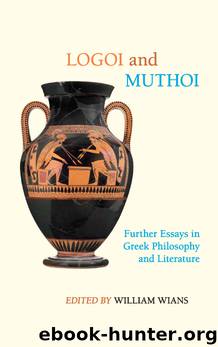Logoi and Muthoi by William Wians;

Author:William Wians;
Format: epub
Publisher: State University of New York Press
Published: 2019-02-27T16:00:00+00:00
Notes
1.See Sheehan 2012, 1 and 115−18, where he explains how the Alexandrian Library handled the ancient Greek materials, including Sophocles’s plays.
2.ὦ πλοῦτε καὶ τυραννὶ καὶ τέχνη τέχνης / ὑπερφέρουσα τῷ πολυζήλῳ βίῳ. O wealth, and tyranny, and supreme skill / these are exceedingly envied in life. This translation is mine. However, I use Meineck and Woodruff’s 1999 translation throughout. Where translation differs from Meineck’s and Woodruff’s text, assume that the English is my own.
3.Consider Creon’s character and actions in Sophocles’s Antigone and his Oedipus at Colonus.
4.This is how Daniel Plainview refers to his adopted son H. W. at the end of There Will Be Blood.
5.At line 799 Oedipus calls Laius τύραννον and at line 1043 Oedipus, again, refers to Laius as τυράννου.
6.Meineck and Woodruff translate the line as “hubris grows from tyranny” (1999, 36). This reverses the order of generation, making out hubris to be the offspring of tyranny and not the other way around. In the original, ὕβρις can be read as a feminine noun that appears either in the nominative singular or in the accusative plural. The verb, φυτεύει, is in the third singular present indicative active, and τύραννον is in the singular masculine accusative. Since the latter cannot be a nominative subject, it is more likely that τύραννον is an object of ὕβρις, and not the other way around.
7.See Davis 1999, where he describes tragedy as a “metaphorical analysis of a metaphor [during which] … [t]hings that at first look accidental in retrospect become absolutely necessary” (93).
One of the play’s many puns occurs at line 924. Given the context, Oedipus’s name can be understood to mean “see” or “know” where. Oedipus—Oἰδίπους—contains οἶδα, which is the perfect tense of the aorist εἴδω. Both verbs are the cognates of ὁράω. The meaning of the verb changes from “seeing” in the aorist, to “having knowledge” (in the sense of “having seen”) in the perfect tense. Cf. Liddell and Scott 1953, 483 and 817. See, also, Sallis who notes that “in Classical Greek, εἴδω was obsolete in the present active and was replaced by ὁράω” (2012, 134n8).
Benardete comments on the lines 924−26 and says that Oedipus is “an oide-pous (knows-a foot)” (2000, 76). Benardete goes on to connect the more common interpretation of Oedipus’s name—swollen foot—to “hubris [which] makes man rise to heights he cannot maintain and hence plunges him into sheer compulsion, ‘where he wields a useless foot’ (873−79). The swollen foot that is Oedipus finally trips him up” (77).
8.εἰ δ᾽ αὐτὸς ἦρχον, πολλὰ κἂν ἄκων ἔδρων. / πῶς δῆτ᾽ ἐμοὶ τυραννὶς ἡδίων ἔχειν. If I am myself a ruler, I would have to do many things against my will. / Why should tyranny be to my liking?
9.Cf. Zimmermann 2005, 65.
10.Woodruff reports that Sophocles was venerated as a hero and associated with Asclepius’s cult (1999, xn.4). On the history of Asclepius’s arrival to Athens, see Burkert (1998, 139, and 155). Whereas Burkert places the arrival of the cult following the events of the plague in 429 BCE, Wickkiser cites 420−419 BCE as the date of cult’s acceptance in Athens (2008, 36 and 62).
Download
This site does not store any files on its server. We only index and link to content provided by other sites. Please contact the content providers to delete copyright contents if any and email us, we'll remove relevant links or contents immediately.
| Africa | Americas |
| Arctic & Antarctica | Asia |
| Australia & Oceania | Europe |
| Middle East | Russia |
| United States | World |
| Ancient Civilizations | Military |
| Historical Study & Educational Resources |
Mythos (2019 Re-Issue) by Stephen Fry(1568)
Alexander the Great by Robin Lane Fox(1358)
On Sparta (Penguin Classics) by Plutarch(1192)
Antigone Rising: The Subversive Power of the Ancient Myths by Helen Morales(1142)
Persian Fire by Tom Holland(1085)
The Last Days of Socrates by Plato & Christopher Rowe & Plato(1017)
The Classical World: An Epic History From Homer to Hadrian by Robin Lane Fox(1009)
Cicero by Anthony Everitt(995)
The Athenian Constitution (Classics) by Aristotle(947)
Antigone Rising by Helen Morales(844)
The Greek World(823)
The Riddle of the Labyrinth(820)
The Story of the Greeks (Yesterday's Classics) by Guerber H. A(798)
The Homeric Hymns (Penguin Classics) by Homer(755)
The End of the Bronze Age by Robert Drews;(745)
The Eudemian Ethics (Oxford World's Classics) by Kenny Anthony(741)
Guide to Greece by Pausanias(732)
Lords of the Sea: The Epic Story of the Athenian Navy and the Birth of Democracy by John R. Hale(708)
A History of My Times (Classics) by Xenophon(708)
